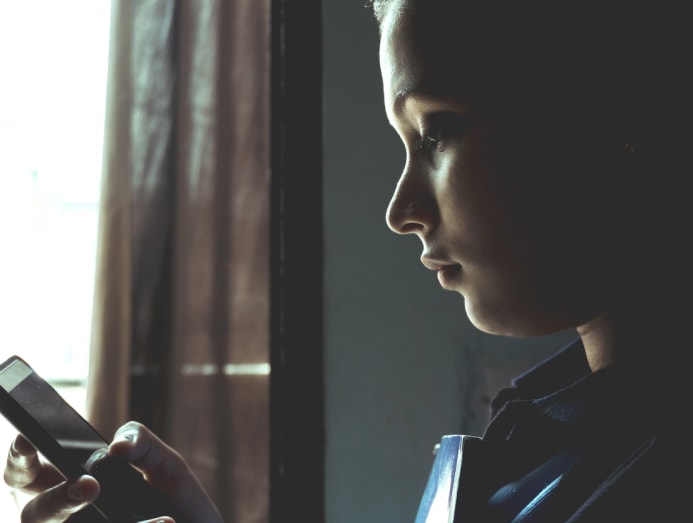Commentary: Post PSLE, what if a 12-year-old wants an Instagram or TikTok account?
This question must be asked in many households and parents are fearful of all the negative consequences of heavy social media use. Mum of a tweenager, June Yong, writes of this dilemma.

Mother and daughter looking at smartphone. (Photo: iStock)
SINGAPORE: When it comes to social media, parents of teens may find themselves lodged between a rock and a hard place.
Unlock the floodgates and you might find it hard to regain control once it’s been given. Hold onto the keys tightly and your teen might grumble at you daily – until you eventually cave. Or worse, set up secret accounts elsewhere.
A friend and I have been discussing when to allow our 12-year-old daughters access to social media. Since the PSLE ended, our girls have been asking for the green light to their own Instagram accounts.
Both of us are hesitant. A recent news report from The Wall Street Journal states 13 per cent of British users and 6 per cent of American users traced the root of their suicidal thoughts to Instagram – a study from Facebook’s own internal research on its teen audience.
About a third of the teen girls said Instagram made them feel worse about their bodies, leading the social media giant to conclude: “We make body image issues worse for one in three teen girls.”
The problems with teens and social media have been increasingly documented, with top concerns including that it commands too much of their time and attention, and has negative impacts on a child’s self-esteem and mental health.
In a critical time of their life, teens are bombarded with posts which researchers say affect their attitudes and feed their anxieties.
Psychologist and researcher Jean M Twenge writing in The Atlantic calls this an “earthquake”: “But the twin rise of the smartphone and social media has caused an earthquake of a magnitude we’ve not seen in a very long time, if ever. There is compelling evidence that the devices we’ve placed in young people’s hands are having profound effects on their lives—and making them seriously unhappy.”
Yet, social media is the lubricant of how we communicate, the intractable platforms of our lives, a kind of a digital diary that showcases all the things we find joy in.
As parents, it is getting harder to stand by the unpopular decision of keeping social media at bay. Yes, there’s an age limit to sign up on Instagram but so many of my daughter’s classmates already have accounts.
Are we down to a matter of when, and not if? How do we teach our 12-year-olds to navigate the social media minefield – with its related issues of cyberbullying, body image issues and sexualisation?
SETTING SMART LIMITS ON SMARTPHONES
Smartphones are designed to be addictive and who better than adults to know this is true?
It is simply how their business models work. The more successful companies like Snapchat, Facebook, YouTube and TikTok tap into this. A recent report shows Facebook’s algorithm has been prioritising posts that elicited emoji reactions, ranking these five times more valuable than traditional “likes”.
Posts likely to yield similar reactions were more likely to show up on your feed, and to contain misinformation, spam, or clickbait.
In order to play safely on this “battleground” some parents impose strict time limits. May Cheo, a HR practitioner in her 40s, sets aside a digital detox day for her younger daughter, Anya (13) who started using social media this year.
Her daughter has to keep her phone away for the whole day, except for pockets of time before or after meals to check if there are urgent messages on homework.
This discipline should apply to parents but rarely do. With COVID-19 still raging and work-from-home still a reality for many of us, it’s so much easier to hand them a phone and keep them out of our hair.

Setting consistent and clear rules on social media use is not easy but the opposite – letting a young child loose without boundaries would make it near impossible to rein in the habit after it is already formed.
Yet, despite the effort and time this needs, there’s no running way from the fact that parents are the key gatekeepers of our children’s digital lives.
I look at it this way. I would never set my daughter behind the wheel of a car without giving her training and supervision. We can apply the same wisdom to social media.
CONVERSATIONS ARE KEY
Navigating social media safely requires not only considering how mature our children are and active parental monitoring, but mutual understanding on how such apps work.
We recently watched The Social Dilemma on Netflix as a family to highlight to our children the potential dangers around social media use and to teach them explicitly what these apps are designed for.
The documentary was most striking for its dramatisation of the life of a depressed teenage girl and her never-ending search for online approval. The comments she received about her looks often seep into real life and continue to haunt her.
Such documentaries may be a good place to start critical conversations. By giving our children a glimpse into their raison d'être, they can appreciate how social media has been developed to hold our attention and whet our appetite for more.
ARMING KIDS WITH EMOTIONAL SKILLS
But to focus solely on avoiding social media for as long as possible, without due consideration of the emotional needs driving us there in the first place, seems to be sidestepping the issue.
There are deep and real human needs that push us to continually engage with our smart phones and social media, such as the need for belonging, connection, esteem and autonomy.
For teen girls, the desire to be seen and validated is particularly strong at a stage where they are still forming and negotiating their identity.
So perhaps whenever our teens pick up their smartphones, we could ask them: What am I needing at this moment when I pick up this phone?
And when the time comes for them to embark on the social media journey, parents should invest in being actively involved in your child’s journey on social media – not for surveillance but to talk about who they follow, why they like these accounts and what the potential red flags are.
A friend shared that once she had to stop her children from watching a Minecraft video online as the host was using foul language profusely. But she too acknowledges constantly monitoring what her kids are consuming is less effective compared to knowing what they are engaged by and talking to them about it.
BUILDING UP OTHER AREAS
Perhaps the best balm against the fear of our children being sucked into a social media black hole is quality family time. Time spent with them doing things that build up all their other interests.
It may not seem like it, but when families exercise or play sports, board games or cook together parents are building valuable guardrails for children. Children, even when they are teenagers, have a chance to see that their phones don’t have to be the only exciting thing in their lives.
This view is also echoed by Anna Lembke, the chief of the Stanford Addiction Medicine Dual Diagnosis Clinic at Stanford University and the author of Dopamine Nation. According to Lembke, family members need to “collectively all turn our attention to each other” whether it’s at the dinner table or elsewhere. “We have to do that in order to preserve those connections.”
The social media tide is not going to turn anytime soon, nor should we expect tech companies to do anything other than gun for more reach and revenue.
So parents have to play a much larger role in this – laying small but important planks of understanding, human connections and emotional skills.
Only then can we hope to ride this wave as safely as we can. Start now when your 12-year-old asks for an Instagram account.
June Yong is Lead of Insights at Focus on the Family Singapore and owner of MamaWearPapaShirt, a blog that discusses parenting and education in Singapore.













